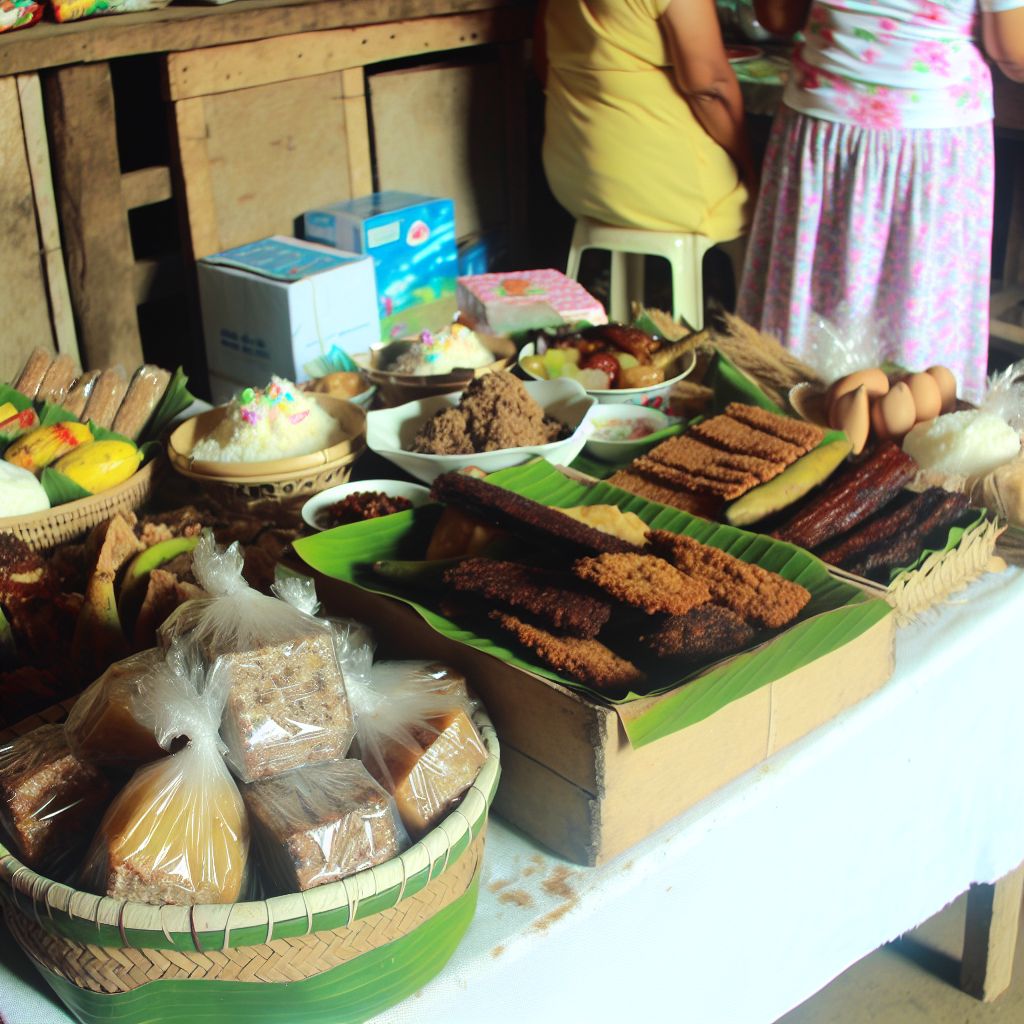Deutsch: Pasalubong / Español: Pasalubong / Português: Pasalubong / Français: Pasalubong / Italiano: Pasalubong
Pasalubong refers to a Filipino tradition involving the giving of gifts or souvenirs, often food items, brought home by someone who has traveled from one place to another. It is a deeply rooted practice in Filipino culture, symbolizing thoughtfulness, affection, and the sharing of one's travels with family, friends, and colleagues. In the food context, pasalubong often consists of local delicacies or specialties from a particular region, town, or country that are not readily available in the recipient's area.
Description

Pasalubong can range from simple snacks and sweets to elaborate food items, reflecting the richness and diversity of Filipino cuisine and regional specialties. This tradition is a way of connecting and re-establishing ties, emphasizing the importance of family and community relationships in Filipino culture. The act of giving pasalubong is not just about the item itself but also the gesture of remembering and sharing a piece of one's journey with others.
The types of food given as pasalubong are varied and often include preserved or non-perishable items such as dried mangoes, Polvoron (powdered milk candy), otap (puff pastry), and various other regional sweets and treats. These items are chosen for their long shelf life, ease of transport, and their unique representation of the place visited.
Application Areas
Pasalubong is practiced across all regions of the Philippines and by Filipinos living abroad when they return home or send packages to the Philippines. It is a common practice among travelers, OFWs (Overseas Filipino Workers), and Filipinos returning from local or international vacations to bring back pasalubong for their loved ones.
Well-Known Examples
Some popular pasalubong items include:
- Pili Nuts from Bicol, known for their buttery taste and unique texture.
- Mangorind, a candy made from Mango and tamarind, popular in Cebu.
- Barquillos, thin, rolled wafers that are a delicacy in Iloilo.
- Buko Pie, a coconut-filled pie that is a favorite pasalubong from Laguna.
- Dried Mangoes, especially from Cebu, renowned for their sweetness and chewy texture.
Treatment and Risks
Pasalubong items, especially food, are generally selected for their durability and longevity, minimizing the risk of spoilage during travel. However, it is important to store and handle these food items properly to maintain their quality and safety until they are given and consumed. The selection of pasalubong should consider any dietary restrictions or allergies of the recipients.
Similar Terms or Synonyms
- Souvenir: While souvenir is a more general term that can include any item bought or obtained during a trip, pasalubong specifically denotes items intended for gifting upon return.
- Gift: A broader term that encompasses pasalubong but lacks the cultural and travel-specific connotations.
Summary
Pasalubong is a cherished tradition in Filipino culture, embodying the values of generosity, thoughtfulness, and community. Through the simple act of giving food items as pasalubong, Filipinos strengthen bonds with their loved ones, sharing not only the flavors of their travels but also a sense of warmth and connection that is central to Filipino identity and hospitality.
--
Related Articles to the term 'Pasalubong' | |
| 'Culture' at psychology-lexicon.com | ■■■■■■■■■■ |
| Culture is defined as an on-going pattern of life, characterizing a society at a given point in historythe . . . Read More | |
| 'Gastronomy' | ■■■■■■■ |
| Gastronomy refers to the art, science, and culture of food, encompassing everything from the selection . . . Read More | |
| 'Civilization' at travel-glossary.com | ■■■■■ |
| Civilization: A civilization (US) or civilisation (UK) is any complex society characterized by urban . . . Read More | |
| 'Cuisine' | ■■■■■ |
| Cuisine: A cuisine is a style of cooking characterized by distinctive ingredients, techniques and dishes, . . . Read More | |
| 'Gympie' at travel-glossary.com | ■■■■■ |
| Gympie is a historic town located in the Wide Bay-Burnett region of Queensland, Australia. Known for . . . Read More | |
| 'Traditional and Popular Snacks of Korea' | ■■■■■ |
| Traditional and Popular Snacks of Korea: Koreans have developed a variety of traditional sweets and beverages . . . Read More | |
| 'Paris' | ■■■■■ |
| Paris is the city and capital of France, known as the City of Lights. . . . Read More | |
| 'Cheese' at travel-glossary.com | ■■■■■ |
| Cheese in the travel context refers to the exploration and enjoyment of cheese as part of culinary tourism. . . . Read More | |
| 'Country' at environment-database.eu | ■■■■■ |
| Country: In the environmental context, 'country' refers to a geographic and political entity recognized . . . Read More | |
| 'Lunch' | ■■■■■ |
| Lunch, an abbreviation of luncheon, is a midday meal of varying size depending on the culture. The origin . . . Read More | |
